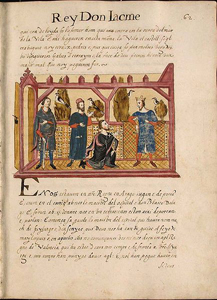Following the taking of
 Mallorca, the expansion of the crown ceased until 1232, when James I
finally decided to move against
Valencia.
The city of Valencia did not fall until Septemeber 28, 1238 after a long land and
sea blockade. The conquest of the rest of the province took place fitfully for
seven years until consummated in 1245. Because Aragon and Catalonia lacked large population
bases, the expulsion of the large Muslim population in Valencia was never
considered. Out of necessity, the crown granted a number of concessions to
the local population which resulted in a Christian government ruling a
predominantly Muslim society. The situation eventually led to the revolt
of the mudéjars in 1276-77. The revolt was put down, but religious
tensions and border conflicts with Castile kept the province in some
turmoil. These conflicts had an unforeseen benefit. The constant turbulence
produced a cadre of experienced fighters in the province who were later
recruited by the crown to fight in Calabria and with the fleet.
Mallorca, the expansion of the crown ceased until 1232, when James I
finally decided to move against
Valencia.
The city of Valencia did not fall until Septemeber 28, 1238 after a long land and
sea blockade. The conquest of the rest of the province took place fitfully for
seven years until consummated in 1245. Because Aragon and Catalonia lacked large population
bases, the expulsion of the large Muslim population in Valencia was never
considered. Out of necessity, the crown granted a number of concessions to
the local population which resulted in a Christian government ruling a
predominantly Muslim society. The situation eventually led to the revolt
of the mudéjars in 1276-77. The revolt was put down, but religious
tensions and border conflicts with Castile kept the province in some
turmoil. These conflicts had an unforeseen benefit. The constant turbulence
produced a cadre of experienced fighters in the province who were later
recruited by the crown to fight in Calabria and with the fleet.
The conquest of Valencia marked an important stage in the expansion of the Crown of Aragon and was recorded by James I in his Llibre dels Feyts (left). In the early thirteenth century, a series of treaties with Castile prevented Aragon from expanding farther south than Murcia. With the Treaty of Corbeil in 1258, the crown virtually abandoned all of its territory north of the Pyrenees to Louis IX, basically the acknowledgment of a long-standing fact. With expansion by the crown on the Iberian Peninsula virtually precluded, Catalan interests turned to Sicily and North Africa. Some historians have asserted that the invasion of Valencia was primarily driven by the Aragonese nobility, and therefore the acquisition of Valencia as a port was of little importance. Even if there were no major economic considerations involved in the conquest of Valencia, the merchant community benefited from the addition of the new port, and, by the time of the War of the Sicilian Vespers, Valencia had become a valuable source of men and material for the fleet.


